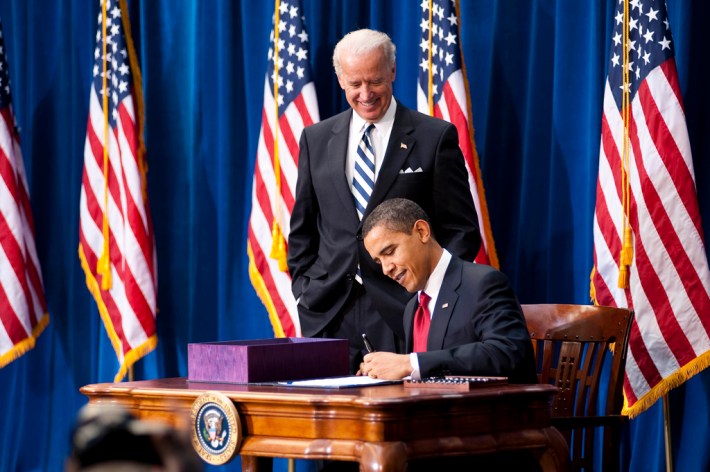President Obama's stimulus bill is one of a small handful of pieces of legislation that have come to define his presidency. Whether you think it was a smashing success or a dismal failure seems to depend on whether there's an R or a D next to your name.
Was the $787 billion spending package was an effective economic stimulant? Was it well administered? These are politically charged questions. The House Transportation Committee met Wednesday for an oversight hearing on the $64 billion transportation portion of the legislation. Even before administration officials could issue their reports, however, congressional reps were trading jabs.

Committee Chair John Mica (R-FL) said the bill "will go down in history as one of the government’s greatest failures."
"I could not be more frustrated by the results that I see," he said, citing still-high unemployment figures. "The total stimulus package was $787 billion. Still we have a stagnating economy."
Rep. Nick Rahall, the committee's ranking Democratic member, however, gave a more generous appraisal. "Do we have more work to do to reduce unemployment? Absolutely," he said. "But would we be worse off today without the Recovery Act? Absolutely."
Committee member Eleanor Holmes Norton (D-DC) noted that the bill had created between 1.3 and 1.5 million jobs, according to the Congressional Budget Office.
"We all share your frustration that the stimulus package did not kill off the recession," said Eleanor Holmes Norton (D-DC) in response to Mica. "I’m not sure many of us thought it would."
One thing is clear, though: because of the stimulus bill, a lot of things are getting built, or are going to get built. Of the $64 billion dedicated to transportation and infrastructure, more than 95 percent of that money has already been obligated to state and local government agencies, officials reported. But about 40 percent of the funds remain in the hands of the U.S. Treasury -- a fact that was bemoaned by Rep. Mica.
More than 19,000 projects were selected for funding, projected to result in 41,800 improved highway miles, 2,700 bridge projects, and about 11,400 new buses and vans for transit agencies. And despite many reversals and changes to the passenger rail program, a total of 738 miles of high-speed rail line is in the works, officials from USDOT reported.
Administrators responsible for overseeing the program reported no major problems but did have recommendations for improving the performance of future initiatives. Calvin Scovel, USDOT inspector general, reported that stronger oversight is needed for local government grantees. Managing so many projects, involving so many grantees, is a huge administrative task, he said. The agency's audit findings over the past year may require repayments of up to $3.7 million from grantees (yes, that's .000058 percent of the total outlays). USDOT is also investigating 51 cases of potential malfeasance, 45 of which the Department of Justice is reviewing for possible prosecution.
That was pretty much the hardest-hitting indictment the GOP could rally around at this hearing they called to show that the stimulus was "one of the government’s greatest failures." The Environmental Protection Agency reported it had not seen significant problems with Recovery Act funds so far, although the agency handled a comparatively minor $7 billion sum. EPA Inspector General Arthur Elkins did, however, raise the concern that the requirement that projects be shovel-ready and completed in an accelerated time-frame made it difficult to fulfill the agency's commitment to environmental justice and disadvantaged communities.
In addition, Phillip Herr, director of physical infrastructure issues for the Government Accountability Office noted, as we've reported before, that merit-based stimulus programs such as TIGER and high-speed rail should take more care to document the award process so as to avoid any appearance of favoritism.
Relatively positive status reports did nothing to quiet disapproval from the right side of the aisle, however. Rep. Mica complained that too much of the money was directed to states like North Dakota and Nebraska, which have maintained relatively low unemployment rates. He noted that many of the jobs created would not be permanent.
Further, Mica questioned administrators about how much stimulus money had to be reallocated because the "projects went south." USDOT officials didn't bite: they answered that a "relatively low percentage" of projects that were awarded funding would not be brought to completion. Furthermore, officials reported many plans came in under budget, allowing USDOT to fund additional projects.
Committee members from both political parties did find one thing they agree on: that transportation investments were the most successful part of the stimulus package and should have been a much bigger piece of the total stimulus pie.
In the end, though, Rep. Mica said the best stimulus for the economy would be a re-authorization of the transportation bill. "If we had a six-year transportation bill," he said, "we would have millions and millions more working."





